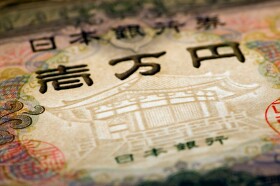The Japanese yen is weakening against several major currencies on Tuesday, despite upbeat economic data and positive news that should strengthen the safe-haven currency. So far this year, the yen has made commendable gains against a basket of rivals, attracting investors fleeing from geopolitical tensions and trade strife.
Domestic business spending surged in the first quarter, shows the latest Ministry of Finance (MOF) data. According to the Japanese government, capital expenditure advanced 6.1% in the January-to-March period, compared to the same time a year ago. It is also up from 5.7% in the fourth quarter of 2018. The increase was driven by gains in chemicals, production machinery and leasing of goods.
The bump in business spending occurred as external trade pressures lingered in the background.
It is now widely anticipated that economists will revise Q1 gross domestic product (GDP) figures that will be published on June 10. Originally, GDP data showed that the worldâs third-largest economy expanded at an annualized 2.1% in Q1, following a 1.6% jump in the October-to-December period.
It was not all good news on the data front, though. The Nikkei Manufacturing Purchasing Managersâ Index (PMI) came in at 49.8 in May, down from 50.2 in April. The market had forecast 49.6. Anything below 50 indicates a contraction. The Nikkei Services PMI is scheduled for Tuesday and the median estimate is 52.
A draft of the federal governmentâs annual economic policy blueprint suggests that Tokyo will employ fiscal stimulus âwithout hesitationâ in 2020 if lackluster global growth and trade protectionism threaten the nationâs economy. The government is expected to finish its proposal for 2020 within the next couple of weeks and use it to develop its budget.
While details of the roadmap have yet to be officially announced, the market already knows what Prime Minister Shinzo Abe has in store for stimulus within the next year, including tax breaks, public works projects, and shopping vouchers. This would be in addition to his planned national sales tax hike.
Meanwhile, on trade, the US and Japan will hold working-level trade negotiations on June 10 and 11. The meetings will focus on industrial and agricultural goods trade, says Japanese economy minister Toshimitsu Motegi.
The USD/JPY currency pair rose 0.06% to 108.13, from an opening of 108.08, at 12:11 GMT on Tuesday. The EUR/JPY edged up 0.11% to 121.61, from an opening of 121.48.
If you have any questions, comments, or opinions regarding the Japanese Yen, feel free to post them using the commentary form below.
Japanese Yen Weakens Despite Better Q1 GDP Amid Higher Business Spending
